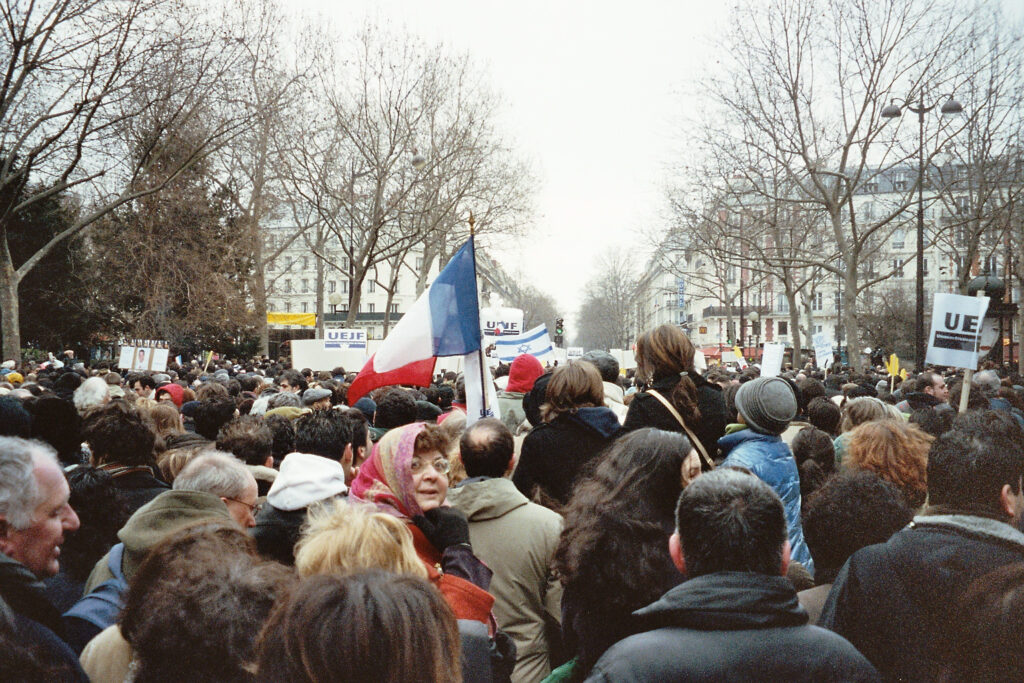A major march against antisemitism is taking place in Paris on Sunday afternoon in an effort to unify the nation against the surge in anti-Jewish acts in France. Movements are planned elsewhere in the country.
In a letter published by Le Parisien, French President Emmanuel Macron has urged unity, stating that the fight against antisemitism "should never divide us nor pitch some of our compatriots against others".
Yet participation by far-right National Rally (RN) has sparked controversy. French government spokesperson, Olivier Véran, rebuked them as "a political party created by the heirs of Vichy", alluding to the French politicians who collaborated with Nazi occupiers during WWII and assisted in the deportation of Jews to concentration camps.
As a result of RN's presence, France's socialist party La France Insoumise announced that it will not attend the march; its leader Jean-Luc Mélanchon said that he felt the march will be taken by Israel as a sign of indifference to the bombardment of the Gaza strip – condemned by human rights organisations around the world for the thousands of civilian deaths (among them several thousand children according to the Hamas-run health ministry) it has led to.
Transcending politics?
For his part, French President Emmanuel Macron has made clear his desire to keep at a distance from the event. Despite efforts to present the march as apolitical, tensions arising in the wake of the 7 October Hamas terrorist attack on Israeli civilians have invariably opened up political divisions, with some seizing on the febrile public discourse to exacerbate deep political and social rifts.
In the immediate aftermath of the 7 October attacks, France banned pro-Palestinian protests, with similar suppression carried out in Germany against actions in favour of Hamas and its calls for Israel's destruction.
On Saturday in London, some 300,000 took to the streets in solidarity with the Palestinian people – one of the largest marches in the UK's history. Though predominantly peaceful, violence broke out on the fringes of the march as far-right agitators carried out a counter-demonstration, many of them chanting derogatory and racist slogans.
Marche contre l'antisémitisme: près de 3000 policiers et gendarmes seront mobilisés pic.twitter.com/zmijEn9oAm
— BFMTV (@BFMTV) November 11, 2023
Macron will not be participating on Sunday but said that those on the streets will be "in my heart and in my thoughts". In a letter published in Le Parisien newspaper on Saturday, the French premier condemned the "intolerable resurgence of rampant antisemitism" and stated that a "France where our Jewish citizens are afraid is not France."
In an interview with the BBC broadcast on Friday, Macron expressed in clear terms that there can be "no justification" or "legitimacy" for the present situation in which civilians, including babies, women, and older adults, are "de facto" being bombed and killed. He implored Israel to stop the "heavy bombardment" of Gaza.
Israel says that Hamas bears responsibility for the high civilian death toll by using the civilian population as human shields and fortifying itself close to and under civilian buildings and facilities. In the interview, Macron also called on the immediate and unconditional release of the Israeli hostages taken by Hamas.
High tensions
Today's march is one of several in capital cities across Europe, with huge turnouts registered at demonstrations in solidarity for the Palestinian people that took place in London and Brussels on Saturday.
Organisers of the event in Paris expect tens of thousands to participate, among them such high-profile figures as former heads of state Nicolas Sarkozy and François Hollande.
Various religious representatives will attend, although Muslim turnout is expected to be low, with various organisations regretting the lack of mention of Islamophobia in the rallying call.
Speaking ahead of the event, Interior Minister Gérald Darmanin said that 3,000 police officers would be deployed to ensure the security of participants.

